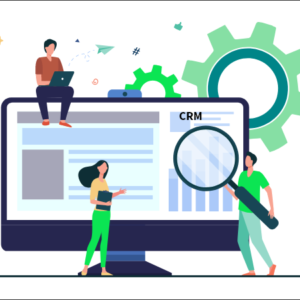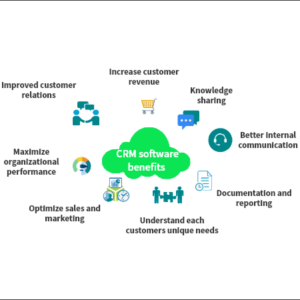How to Manage Your CRM in 2022
Personalization seems to be a tiny and easy tactic in the world of marketing and sales. Though it looks that way, it takes a lot of effort, planning, and real-time inputs to succeed. And that makes your outcomes at least four times better than usual.
Over 80% of customers report that personalized experiences are a major deciding factor in doing business. Implementing the marketing tactics to trick your customers is no longer allowed. Today, you (as a company) need to know everything possible you can about your customer.
But how do you manage everything at once and on the same platform? Is it even possible? The answer is straight and simple. Yes! It is possible to handle all the aspects of customer relationship management on one platform through Customer Relationship Management (CRM) software.
We’ll now learn starting from the basics – what CRM is and how to manage it.
What is CRM, and a CRM software?
CRM can refer to all the related software, tools, and strategies your business uses to track the information and store it. It is a broader term for many aspects that fall under the category of CRM. A good CRM serves as a single source of principal records of an entire organization.
As much as the right CRM data helps you, bad CRM data equally kill your efforts. You must learn how to clean bad CRM data effectively!
The right CRM integrates with many other tools and data sources you would need further, like your email provider, accounting software, and many more. It helps you manage contacts, sales pipelines, and automates your workflow.
Why is CRM important to your business?
Not many businesses know that CRM system is what helps a business get up-to-date and reach their targets for sales, profitability, and business objectives. CRM will help your company translate many streams of data coming from different channels like sales, customer services, marketing, and social media in order to gather all the business information. Any CRM software or tool will give you a clearer understanding of your target audience and their needs, expectations, motivators, pain points, etc.
With CRM software that offers a customizable dashboard, you will be able to tell your client’s history with your brand, their orders, their likes and dislikes, customer services issues, among others. When used in the right way you will be able to understand the pipeline of sales and make accurate forecasting. One of the other advantages of CRM is that it can be implemented in numerous departments including HR, customer services, and even supply chain management.
Benefits of CRM software
CRM software brings every aspect of customer relationship together and acts as the most powerful tool to manage every minute detail. It consolidates your data, automates your workflows, syncs with other tools, helps manage your sales pipelines and contacts
It helps in understanding a lot more about your customers by tracking each interaction with your customers. It keeps all the data you need at your fingertips. Not just the details from the top, but it maintains a customer’s entire history, making it easy for your personalization.
With all the recorded information, you would be at ease recognizing your customer’s needs even before they put it out. This increases the chance of business on good terms. Design future campaigns to address their problems before they start hunting for solutions, isn’t this a deal-breaking trick for you!
You’ll be able to foresee their needs. Create content to answer their common questions. This also helps in retaining your existing customers. Every facility that a CRM system offers your business contributes to a seamless experience making the business flow smooth.
Different types of CRMs:
Sales CRM
It’s the ultimatum of a CRM. Even though it is said that marketing and support teams are heavily dependent on CRM, every activity that happens on CRM leads to bringing in sales. You can:
- Manage your sales pipeline: Helps in segregating the procedures that a sales rep should look into and allows a precise platform for closing a deal.
- Manage details of contacts and leads: Maintain every little detail of your prospect/lead or customer to build further business relationships and smooth transactions.
- Up-selling and cross-selling are a step easier than usual: Through a CRM’s customer tracking, identifying opportunities across a range of customer levels has become easy.
- Analyze the data: Optimize your sales process to become more efficient. This helps in making data-driven decisions.
Marketing CRM
A marketing CRM helps align every stage of the sales pipeline, thus making it easy for personalization. Marketing CRM requires you to:
- Take the data to create detailed data visualizations to provide new insights about your target and potential audience.
- Personalized campaigns! With the existing data, you can consistently offer a new marketing campaign with specific pain points.
- A CRM automates your marketing tasks. Drip campaigns to nurture leads and move prospects to the next stage are easy with automation.
Customer Support CRM
It’s all about retaining the existing customers. A customer support CRM is nowhere near gaining new prospects. This is how you can use your CRM to keep your customers:
- Track your issues across multiple channels: This projects every transaction that happened across all channels you’re on. This gives you in and out information of a customer’s interaction with you in detail, leading to reliable customer service to retain customers.
- FAQs to be handy: Identify the most common problems and address them beforehand through FAQ format.
- Customer service, being at a strong point, contributes to quick solutions to customer-related issues.
Decide upon your success-driven CRM strategy:
- Determine your CRM goals to direct your strategy
- List out and map your customer journey from the start line to the end
- Monitor your sales data and make adjustments to your strategy whenever needed
- Automation is a key factor! Automate your processes to eliminate manual efforts and spend your time wisely connecting with your potential customers.
How CRM can help you in the future?
With the ongoing pandemic, B2B businesses had to make a lot of changes to the way they functioned in order to be able to reach out to customers in a different and a more digital way. Other businesses have also pivoted their business models with CRM, this is to get ready for the age of the connected consumer, who expects an excellent customer journey. Some of the ways CRM will help you in the post-pandemic world are by:
- Using CRM systems for sales, marketing, and customer service will boost your customer experience. A CRM software will help you increase interactions across devices and times, send real-time responses, and improve the customer experience.
- With CRM you will be able to provide engaging content and user experience. CRM makes it easy to hyper-personalize products, services, or even the content.
- With the power of CRM and AI combined, your company can easily improve its decision-making and productivity. It helps your collect data from interactions to predict the kind of messages that your customers will most likely respond to.
- Since it is the age of the Internet of Things (IOT), CRM can help you access all the data from all the connected devices. This way you can leverage IoT to increase customer engagement. Improve your company’s customer retention with the help of customer-oriented processes, curated content and by focusing on your customer’s unique needs.
Endnote
A CRM system plays a vital role in creating a customer-centric strategy for your business. Put your customer as your priority at every stage of the buying process. Follow a customer-first approach to providing an extremely personalized service for your business. Next, make sure to implement CRM software’s to boost your sales and revenue.












